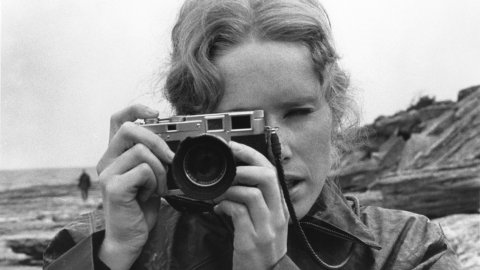
Bergman and Me
Posted on Mon 19 March 2018
In this article Thea Berry who is on placement at Watershed as part of her MA Curating course at the University of West of England (UWE), offers us a female perspective on the films of Ingmar Bergman.
I was first introduced to the renowned filmmaker Ingmar Bergman when I was about twelve. I sat down with my sister to watch probably his most well-known film, The Seventh Seal. It tells the story of a knight whose town has been gripped by the Black Death and seeks answers about life, death and the existence of God, while playing a game of chess against the Grim Reaper. Quite heavy stuff for a 12-year-old. It has been over ten years since I first watched it, and to be honest, I couldn’t remember much about it. Undoubtedly many of its themes had gone over my head. However, what did stick with me was that image of the knight, the chessboard and the Grim Reaper. Was it because as an early adolescent I saw something of my own philosophical musings about life and neurotic existential crises reflected in that image? No. It was more likely down to the fact that I had seen the same image parodied in The Muppet’s go to the Movies, Bill and Ted’s Bogus Journey, and (500) Days of Summer, to name a few. For cinephiles everywhere, Bergman remains deeply significant; he is a filmmaker that demands reverence. However, what really drove me to discover his work is Bergman’s lasting effect on pop and film culture.
When it was time for me to reintroduce myself to Bergman, I began by reading all I could about him. I read articles, books and interviews with people he had worked with. I highly recommend the documentary Trespassing Bergman, just to see the fanatical obsession which surrounds him amongst other filmmakers – Lars Von Trier’s tantrum caused by Bergman not replying to a single one of his letters is particularly entertaining.
Although I was intrigued by the themes which run through his films, and I was impressed by the quality and the quantity of his cinematic work - he was first and foremost a man of the theatre – there was something about him that made me uneasy. Stories of him being obsessive, to an almost tyrannical extent, manipulative, invasive and controlling are littered throughout texts written about him, even if such accounts refer largely to his work in the theatre rather than in film. Bergman’s relationships with the actresses in his films -or as he would have said “my actresses” – is something which I find problematic. Many female stars found him intrusive and oppressive. "He wanted to be extraordinarily close to his actors – too close for comfort. I didn't want to be one of his puppets," the actress and filmmaker Mai Zetterling (who worked with him in the 1940s) recalled. These women found themselves submitting to an intense and intimate working relationship, which sometimes became sexual. The account of Harriet Andersson, who starred in the brilliantly bittersweet Summer with Monika, who began her relationship with Bergman after going to his office to discuss her career over tea, feels more than a little unsettling.
Knowing this, how was I going watch his work without letting this information affect my experience? I decided to jump in at the deep end and watch Persona – the film that many critics have called his masterpiece, and which Bergman himself described as “a creation that saved my life”. It stars two of his muses, Liv Ullman and Bibi Andersson. Ullmann plays a stage actor that falls into silence after a nervous breakdown and Andersson plays a nurse tasked with coaxing her into speech at a summer lake house. Their striking resemblance is what inspired Bergman, sparked by a chance meeting with the two actresses on a Stockholm street corner. The women’s relationship becomes intensely and erotically intimate, but also alien and mysterious. It is compulsively watchable, visually stunning and strange. The visual style, particularly the montage sequences, and themes of Persona have influenced many films such as David Lynch’s Mullholland Dr. Jonathan Glazer’s Under the Skin and even ABBA’s video for Knowing Me, Knowing You.
Aside from Bergman’s visual and philosophical achievements, what set him apart from other filmmakers was the roles he created for women at the centre of his films. As Ullmann has said “I never played the wife, I never played the girlfriend. I was always the main character.” His characters are intriguing and complex, and Bergman is able to bring out some quite astonishing performances. While labelling his films as ‘feminist’ is certainly problematic, there can be no denying that Bergman wrote female characters quite unlike any other male filmmaker of that time, or indeed most male filmmakers of today.
